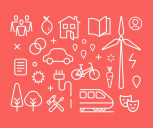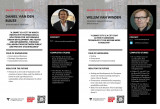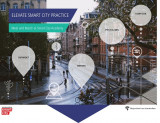Organizers:
Amsterdam University of Applied Sciences – Play & Civic Media: Martijn de Waal & Nina Fistal (intern AUAS); Christian Frankel (Copenhagen Business School); Martijn Arets (Utrecht University/ http://www.deeleconomieinnederland.nl/) in the context of the EU COST Action CA 16121 From Sharing to Caring: Examing Socio-Technical Aspects of the Collaborative Economy http://sharingandcaring.eu/ Mediapartner: The Mobile City
Theme:
One of the promises of the emerging sharing or platform economy is that it could make neighborhoods more resilient: Platforms can provide new economic opportunities for citizens; contribute to social capital formation; empower citizens in democratic processes; and they could play a role in a more efficient management of resources and overall sustainability. At the same time critics have pointed out that platforms could also undermine some of these aspects: they could induce a precarization of labour, lead to social exclusion based on cultural capital, cause social fragmentation, or increase rather than decrease the use of resources.
In this workshop we want to further discuss / explore the relations between the rise of a platform economy in relation to the organization of resilient (social inclusive, sustainable) neighborhoods. What contexts, policies, design principles and governance models of digital platforms could contribute to more resilient neighborhoods? In particular, we would want to shift the debate from a focus on the major international platforms such as Airbnb and Uber, and explore the opportunities for locally organized platforms in relation to resilient neighborhoods.
Goal /Expected Outcomes:
The aim of this workshop is to understand better how local sharing economy initiatives can succeed. To do so three such initiatives will present their aims and their experiences. In learning from and with these three initiatives, their differences as well as similarities, we wish to discuss three questions:
* what are the aims of local initiatives for local communities and what are the aims of local communities with local initiatives?
* what are the specific problems of developing local initiatives — such as privacy and securing interests of users — and how are these problems handled?
* what tools are available for local initiatives — in terms of organizational structures, ownership forms, platform designs — and how are such tools used in practice?
.
Programme:
13:00-13:30 Introduction of participants & themes
13:30-14:30 Introductionary remarks & context
Break
15:00-15:30 Introduction of Cases
15:30-16:30 Groups discussions
16:30-17:00 Plenary reports & Conclusions
17:00 Drinks & Dinner (optional)
Want to participate?
We welcome applications for participants. This will be a small scale in depth workshop with limited capacity. If you are interested please send an e-mail with a brief bio (1-2 paragraphs) and motivation (1-2) paragraphs to ninafistal@gmail.com no later than April 8. We will let you know whether we are able to accomodate you before April 10.
Contact:
For questions about practicalities, please contact ninafistal@gmail.com; for other questions b.g.m.de.waal@hva.nl





